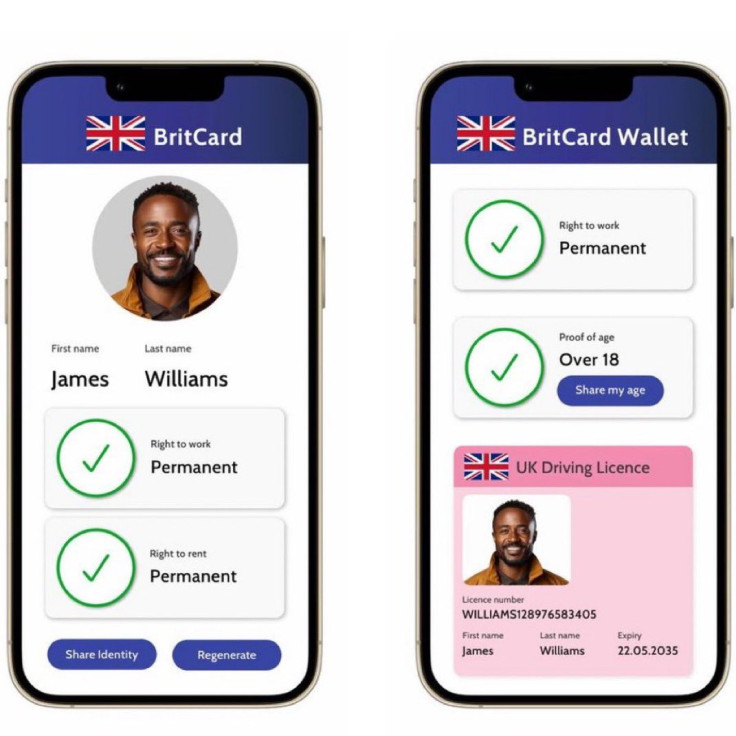UK's New Digital 'Brit-Card' ID Is Mandatory for All Citizens: Here's What Happens if You Don't Comply
BritCard digital ID becomes compulsory for UK citizens, raising concerns over access, enforcement, and civil liberties

The UK government is set to introduce a compulsory digital identity system known as the BritCard, billed as a tool to tackle illegal immigration and streamline access to jobs, housing, and public services.
Prime Minister Keir Starmer is expected to formally announce the policy in the coming days, sparking fierce debate over privacy, civil liberties, and enforcement.
The BritCard represents one of the biggest overhauls of identity verification in UK history. For ministers, it is a step towards efficiency and security. For campaigners, it risks undermining democracy and embedding inequality.
What Is the BritCard?
The BritCard is a government-issued digital ID designed to verify an individual's right to live and work in the UK. It will be required when starting a new job, signing a rental agreement, or accessing certain public services.
The BritCard scheme draws policy inspiration from Estonia's advanced e-ID system, which enables citizens to vote, access healthcare, and manage finances digitally. Cabinet Office Minister Pat McFadden has publicly referenced Estonia's model as a benchmark for modernising the UK's digital identity infrastructure.
According to The Independent, the system will operate through a smartphone app linked to a central government database. Employers and landlords will be required by law to verify status through the platform.
Is It Really Mandatory?

Despite official statements suggesting voluntary adoption, multiple reports indicate that the BritCard will be compulsory for all UK adults. According to The Independent, the government intends to legislate the scheme following a consultation period, making it a legal requirement for both citizens and legal migrants.
The Data (Use and Access) Act, which received Royal Assent in June 2025, provides the legal framework for digital verification services. While the government insists the Act does not mandate digital ID cards, critics argue that since the BritCard will be embedded in employment and housing checks, opting out will be practically impossible.
This means all UK adults and legal migrants may be required to hold one, making the system effectively compulsory.
What Happens If You Don't Comply?
Failure to present a BritCard when required may result in denial of employment, housing, or access to certain services. Employers and landlords will be legally obligated to verify status through the system, and failure to do so may result in fines or penalties.
While enforcement details are still emerging, civil liberties groups warn that the scheme could disproportionately affect vulnerable populations. Those without smartphones, digital literacy, or stable housing may struggle to access or maintain their digital ID, potentially pushing them further into the margins of society.
Civil Liberties Concerns
The BritCard proposal has drawn sharp criticism from privacy advocates. Big Brother Watch, Liberty, and other organisations argue that mandatory digital ID risks creating a surveillance state and eroding personal freedoms.
In a joint letter to the Prime Minister, eight civil rights groups warned that the scheme could 'shift the balance of power towards the state with dangerous implications for our security, rights and freedoms.'
Rebecca Vincent, interim director of Big Brother Watch, described the BritCard as 'uniquely harmful to privacy, equality and civil liberties.' Her organisation has gathered over 101,000 signatures on a petition urging the government to abandon the plan.
Government's Justification
The government argues that the BritCard will help combat illegal immigration and reduce fraud in the black economy. Home Secretary Shabana Mahmood, a long-time supporter of ID cards, said the system could 'help with illegal working and the enforcement of other laws.'
Labour Together, a think tank closely aligned with Starmer's administration, claims the BritCard could save billions in public spending and prevent exploitation of undocumented workers. The group's June 2025 report called for a 'mandatory national digital identity' issued to all individuals with the right to live or work in the UK.
As the UK prepares to implement the BritCard, the nation finds itself at a crossroads between digital efficiency and civil liberty. While the government touts the scheme as a modern solution to immigration and fraud, critics warn of unintended consequences and the erosion of personal privacy.
As implementation looms, public response will determine whether the BritCard becomes a flagship reform or a defining flashpoint in Britain's battle over digital freedom.
© Copyright IBTimes 2025. All rights reserved.





















